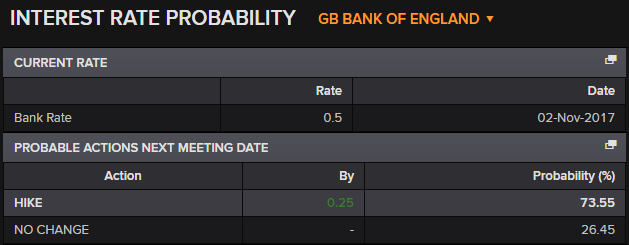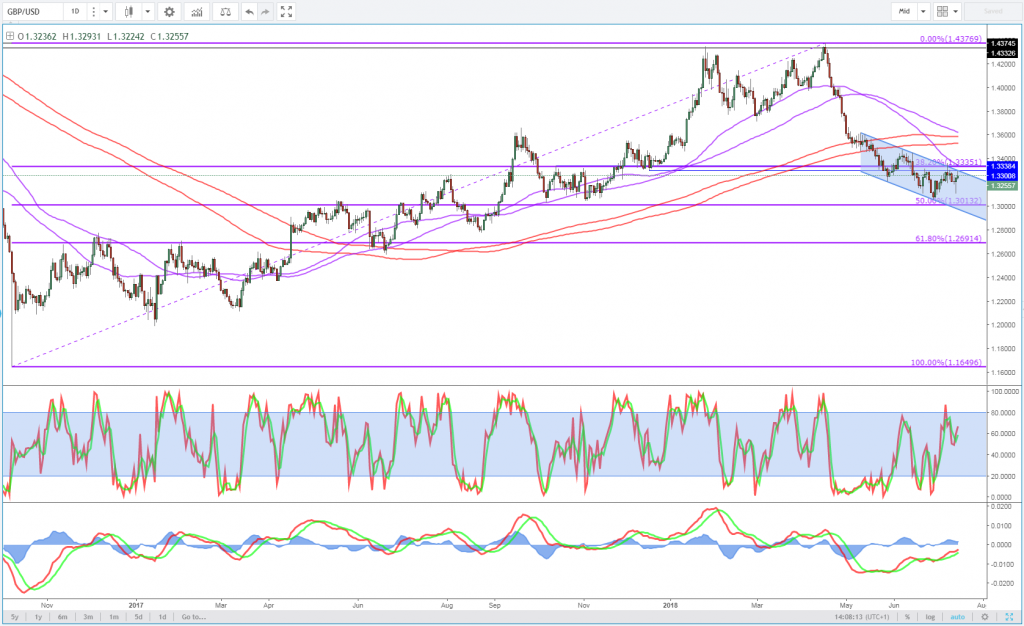
Is August rate hike hanging on this week’s data?
It’s shaping up to be another interesting week for the UK both in politics – as MPs debate two new Brexit-related bills – and on the economy, with a number of data releases potentially paving the way for an August interest rate hike. While the former will have a greater impact on the fate of the country in the long run, both bills are expected to pass without defeat for the government which makes the data potentially of more interest right now.
- Is Q2 data enough to warrant raising rates?
- Can BoE afford to delay hike again after May setback?
- GBP sensitive to data after near 10% decline in recent months.
What makes the data so interesting is the fact that the Bank of England backtracked on a rate hike in May, citing the slowdown in the first quarter for doing so, while stressing the belief that this was temporary. The data since then has alluded to the temporary nature of that and should the releases this week further support that, it seems logical to assume they will proceed in two weeks’ time.
The timing of the rate hike is clearly not ideal, with the UK stuck in negotiations with the EU over its exit and nearing the deadline for when an agreement is needed, so that it can leave in March next year. Raising interest rates and being forced to reverse course a few months later would be extremely embarrassing but it has backed itself into a bit of a corner.
DAX ticks lower as investors look for cues
Of course, it could hold off until November, at which point the data will paint a much clearer picture of the economy and a Brexit deal should have been reached, in order to be ratified by all countries by March. But that would come at a credibility cost, which I don’t think they will accept.
The central bank has suffered many credibility setbacks since the referendum in 2016 and I believe they will weigh up the risks of no deal being agreed and decide to push ahead with raising interest rates on 2 August. Investors are clearly also in agreement, with markets pricing in a 73% chance of a hike.
UK Interest Rate Probability
Source – Thomson Reuters Eikon
So what difference will the data make?
A good batch of data this week could see that number rise quite a bit still which could provide support for the pound after a difficult few months, particularly against the dollar where it continues to hover around eight month lows.
A combination of dollar strength this year and a weaker pound driven by a slowing economy, indecisive BoE and Brexit uncertainty has seen the pair fall back from 1.4375 to 1.3050 – a fall of more than 9% – where it has found some support. Should we see a change on all three fronts, which is very plausible in the coming months, this could provide further support for the pair.
GBPUSD Daily Chart
OANDA fxTrade Advanced Charting Platform
Weaker data on the other hand could lead the Monetary Policy Committee to once again question whether now is the right time to be raising interest rates, particularly considering where we are on Brexit, and given that they have form for holding off on hiking, there’s no reason to assume they won’t do it again.
In terms of which data could trigger such a move, I think the inflation and retail sales figures will be the most keenly watched. The former will be interesting for obvious reasons, with inflation running above target but on the way down – although it is expected to tick higher on Wednesday – while the latter has been a source of weakness for some time due to the consumer squeeze.
This was until May when we saw a jump of 3.9% and policy makers will be interested to see just how sustainable this is. June will get an additional boost from the good weather and World Cup fever and is expected to post another 3.9% increase on an annual basis. This may be enough to convince policy makers that consumer sentiment is on the rise and the time to hike rates is now. A bad number on the other hand would make May look like a one-off, especially given the boost that the previously mentioned factors are expected to bring.
With a hike so priced in, there is potential for this to be a tough week for the pound if the data falls short of expectations, forcing investors to re-evaluate whether a rate hike is as likely as they currently believe.






